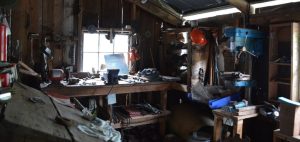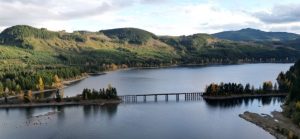
The complete McLean Mill National Historic Site – Overview location file includes 508 images to show its incredible variety and detail. Photo courtesy of INFilm/Jane Victoria King
VANCOUVER ISLAND – The line producer and location manager behind the film One Mile arrived on Vancouver Island for a quick look at a single location. They wanted to see McLean Mill National Historic Site, located just outside Port Alberni, in person. Based on a handful of location images they’d reviewed; they felt it might suit a single day of filming for the upcoming production.
Brandon Lepine, Regional Production Service Manager with Vancouver Island North Film Commission (INFilm) saw it as an opportunity to land more of the production on the island.
“We drove them to McLean Mill, then around the City of Port Alberni, Parksville, and Qualicum Beach,” said Lepine. “The next day we sent them a location package with the complete McLean Mill file and a selection of other locations.”
Just a few days later, INFilm’s work paid off. They declared they wanted to shoot the entire film and its sequel entirely on Vancouver Island. Based on what they’d seen at McLean Mill and the detailed location files captured by Locations Scout Jane Victoria King, they believed that more than half of the two films could be shot at the mill location. The surrounding areas were also the look they wanted for all supporting scenes.
Compared to shooting in Vancouver, the decision had multiple benefits. McLean Mill allowed more of the movies to be filmed in a single location, rather than moving around to a collection of sets in Vancouver. The Island also has lower location fees and easier permitting.
The opportunity to host these two productions arose from INFilm’s recent initiative to update and expand their location database, with an investment through Island Coastal Economic Trust’s Investment Readiness Program. INFilm contracted 12 location scouts to update the existing locations database. Their goal, to further establish Vancouver Island and the coast as a film production destination, is already paying off.
The organization serves a large area, covering all Island communities from Ladysmith to Cape Scott, the northern Sunshine Coast and southern Great Bear Rainforest. Its existing database stood at 2000 files, but most were considered out of date because they had been captured before 2008. Once completed, they project having more than 3000 new or updated location files from around the island.

By augmenting scouting with the usage of drone photography, INFilm not only refreshed their location database but also added unique perspectives that show each locations potential. Photo courtesy of INFilm/Suzanne Jolly
Gord Kurbis is a freelance producer and videographer based in the Comox Valley. He has nearly four decades experience in the industry, including 18 years as a journalist with CTV News.
“When the opportunity came up to be a location scout, I stuck my name in right away,” said Kurbis. “The first workshop we did with a scout from Vancouver, the teacher said we had to be part detective. It pairs nicely with my journalism background.”
Initially contracted to scout the Strathcona Regional District area, Kurbis’ work has given him the opportunity to work directly on productions across the region. Lepine recommended him to the One Mile production team, where he spent two weeks scouting the Alberni Valley and Parksville area for the production.
Kurbis has an intimate, almost unmatched, knowledge of Vancouver Island thanks to his time with CTV News. When a production team provides a description of what they need, whether it’s an isolated gas station or an area that could look like a small town in rural America, he usually has a good idea where to start looking. He also understands the value communities realize when selected for production.
Because productions will travel anywhere in the world to film, Joan Miller, Executive Director, INFilm, says it’s critical to stay competitive.
“All of our services sell the destination,” says Miller. “We reduce costs, simplify the permit process, and offer industry-standard production support.”

The Beach Club Resort, in Parksville, often hosts productions; however, the resort is also listed within INFilm’s location database as a potential set. Photo Courtesy of INFilm.
The benefit of their coordinated approach reaches well beyond the film industry.
“We don’t just look at the creative side of it,” said Miller. “For us, it’s all about the economic development and job creation. We might be in the film business, but we are an economic driver.”
When Chesapeake Shores filmed in the Parksville-Qualicum area from 2016-2022, the Beach Club Resort hosted many of the producers and actors involved in the show.
“It was a huge benefit,” said Lisa McCormick, General Manager, Beach Club Resort. “They would arrive in the off season, in February, and leave just before we would get busy in July and August.”
The hotel benefitted, earning over $300,000 in annual room revenue from the production and additional food and beverage sales because many of the production guests would dine in every day.
“We would love to get another Chesapeake Shores,” said McCormick. “ It was a benefit to all the hotels in the area and we saw how many local suppliers benefitted. It was a big piece of business for this area.”
This summer, Beach Club Resort gained 120 room nights from the One Mile and One More Mile productions. These films did contribute significantly to other accommodation providers, catering departments, chartered transportation companies, and fuel sales.
“We were on the Island from the end of July until October,” said Rudolph, “and some staff stayed into November. During that time, our spend in the Parksville-Alberni region was $3.0 million, including at least $1.0 million on accommodation services.”
Rudolph also pointed out the natural industry growth and capacity building that occurs whenever a production spends an extended period in a community.
“You always end up training up and incentivizing more individuals to be part of the next project that will come to the region,” Rudolph said. “We would have tapped into people that worked on Chesapeake Shores, and then we’ve trained new people for the next show that films in the region.”
INFilm owns a location truck and locations kit, which they can provide to productions as well as use to train new film workers. Not only does this remove the cost of bringing in a trained crew from Vancouver or further abroad, but it also provides opportunities to residents interested in employment and gives these individuals valuable film experience on a variety of sets.
Film productions also benefit the tourism industry by drawing more visitors to the Island’s diverse attractions.
“Just days after Island of the Sea Wolves premiered on Netflix,” said Lepine, “a family showed up in a minivan in Tahsis, all the way from Kentucky, looking for wolves. There is a direct link from film to tourism. In my mind, that is the power of film.

Reel Obsession Fishing Lodge hosting TV productions as part of their marketing initiatives. Photo courtesy of INfilm/Gord Kurbis.
In Zeballos, Adrian O’Connor, co-owner, Reel Obsession Fishing Lodge and Charters, believes the film industry can reach potential customers in a way that other marketing initiatives cannot match.
“My first TV spot was a cooking show with CityTV almost 20 years ago,” said O’Connor. “Then Gary Cooper, from Gary Cooper’s Fishing Diary, contacted us out of the blue and it just went from there.”
Since those debut TV appearances, his business has grown substantially. He started with a single boat, but now has two lodges, 19 full-time staff, and 9 boats on the water throughout the peak fishing season. He continues to prioritize film productions throughout his marketing plan.
“We have three productions booked for next year,” says O’Connor, “and we had three last year. Different productions sell things differently, but it’s a huge marketing tool for us.”
Because of INFilm and the work of their dedicated location scouts, we’re bound to see more Island stories reach the big screen, too, and help drive our economy forward in a sustainable way.
“At INFilm, our mantra is that film is a sustainable industry,” said Lepine. “It creates jobs, generates revenue, and leaves only a film on screen six months later. Everyone loves entertainment.”
Source: icet


